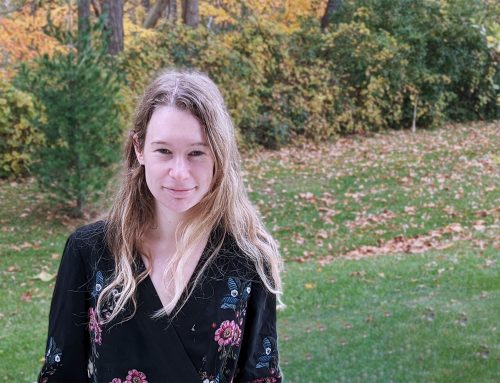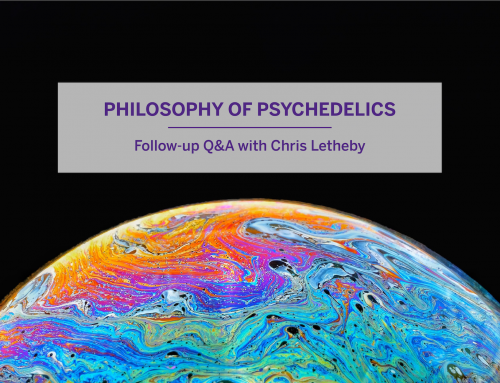Justin Donhauser joined the Rotman Institute as postdoctoral fellow this fall. He specializes in socially-relevant philosophy of science — focusing on clarifying how model-based ecological and climate-science methods can aid in political, ethical, and resource management decisions. Justin trained as a PhD fellow of the National Science Foundation endowed Ecosystem Restoration through Interdisciplinary Exchange (ERIE-IGERT) program at the University at Buffalo, has worked on various community outreach projects, served as a Service-Learning Faculty Fellow, and has taught numerous community-engaged-learning courses dealing with Sustainability and Environmental Justice issues. He sat down recently with Jody Tomchishen to discuss his research, and what he is working on here at the Rotman Institute.
Jody: You are involved with the Geofunctions Initiative, could you explain what that is and what unique background you bring to the table to help with that Initiative?
Justin: Well, there are numerous people involved with numerous projects attached to the larger Geofunctions Project. So, a comprehensive answer here would be very long. But, in overview, all of the geofunctions projects in some way examine the sciences of large-scale natural processes, the interconnections between those processes and human systems, and attempt to suss out practically, politically, and ethically significant implications for public policy, resource management, and scientific practices.
Several of the projects I’m working on look at ecological research and theory, and try to develop a metaphysics and epistemology of ecology to help understand potential applications of research methods used by ecologists; again, with a focus on making plain how those methods can aid in environmental policy and resource management decision-making. I’m also doing some work that explores heuristic applications of new “climate event attribution” methods for UN climate-policy implementation decisions. And, with others in the geofunctions group, I’ve started working on projects that extend ideas from evolutionary psychology and incorporate data from interviewing community organizations and not-for-profit outreach groups to devise a framework, or a generalizable set of principles, to aid in realizing efficient and ethical institutional responses to emerging sustainability issues. Our initial focus in that work is trying to garner insights by looking into organizations who are in some way already addressing emerging “climate refugee” issues in urban areas around the Great Lakes. The geofunctions broader group has also been organizing a large interdisciplinary conference that will bring together scientists, philosophers, and policy experts to discuss how to go about realizing effective and ethical responses to climate change in light of the United Nations Framework Convention on Climate Change agreement drafted at the Paris Convention in 2015.
There are many other active projects as well, but I think that list provides some insight into what the Geofunctions Project is and what we are trying to do.
As for my unique background. In much of what I do, I draw on training in ecological engineering and applied geomorphology, and on fieldwork and outreach experiences, I was fortunate to gain as a Fellow in the National Science Foundation’s ‘Ecosystem Restoration through Interdisciplinary Exchange’ (ERIE-IGERT) program at the University at Buffalo. Some other unique experience that has had an influence on things I’m doing here at the Institute is attached to teaching I did before coming here. Basically, through teaching Environmental Justice and Sustainability courses that included substantive community-engaged-learning components, I have learned a lot about the special sociopolitical challenges we face in addressing urban sustainability issues and have made a lot of useful connections with people working with community activist groups, not-for-profits, and public works organizations.
Jody: So, some of your work in philosophy of science surrounds the idea of using theoretical ecological models to inform environmental policy, could you say a bit more about what you have contributed to this area of research?
Justin: Yeah. A bunch of my recent works further develop arguments of my dissertation. My dissertation examines key historical moments and studies in ecology to dissipate enduring confusions about the metaphysical and epistemological foundations of model-based ecological research and illuminates ways that that sort of research can be useful for policy and management-strategy decision-making. Two projects in this vein are representative of some ways I’ve been contributing to the literature about ecology and its practical value.
One is my recent paper in Studies in History and Philosophy of Biological and Biomedical Sciences. In that paper, I track early theoretical ecologists’ shift away from teleological metaphysics, and clarify general heuristic roles that teleological metaphors play in contemporary ecological research.
The other, is a paper that will be out in Ethics & the Environment in December 2016. In that one, I outline a background theory of “ecological networks” that I show is apparently embraced by modern ecologists, and then examine the implications of that background theory for how existing pieces of national and international legislation that call to protect ecosystems and “ecosystem properties” can be usefully interpreted and operationalized.
It comes to mind that after the Rotman Institute postdoc “meet-n-greet,” where we (postdocs) presented what we are working on, Stathis Psillos said that he found my work interesting because it was, as he put it, “both up in the clouds and at the same time very much down on the ground.” I really like that way of describing it, and took that as a great compliment, because my main research, my work on ecology, really has focused on doing these sorts of metaphysics and epistemology of science projects that broach variations of more general philosophical issues but also focus on doing that work to glean insights with practical value.
Jody: Can you speak about the road blocks that exist between communicating scientifically robust ecological information, that would presumably better inform our policy-making, to politicians, some of who, for example, think that snowballs disprove the existence of anthropogenic climate change?
Justin: I suppose the “road blocks” to communicating science to policy-makers and politicians are the same blocks that divide all domains of knowledge and action. In ecology, and its sub-domains, domain-specific languages (“jargon”), conceptual schemes, investigational processes, and inferential methods have emerged. So, for anyone unfamiliar with all of the conceptual machinery, it’s really easy to find ecological theories, models, and data puzzling; or to misunderstand what ecologists are saying and fail to see ways they can help inform policy and management strategy decisions. But even very complicated concepts and methods can be explained in general terms, and in incremental steps, “baby steps,” that are correct and illuminating. And a large part of what I do in a lot of my work is clarifying how environmental science research methods work and how they can be useful by tracing, or I guess re-tracing, what I like to call the ‘inferential flow’ of reasoning using those methods. Which is essentially walking one through how things work—through the chain of justification and inferential steps—as an effective science teacher would. Of course, as a philosopher, I’m also looking at epistemological, metaphysical, and ethical implications of these sorts of “walk-through” analyses of science methods along the way. Still, the important part in communicating how the science works, and overcoming blocks, is figuring out how to walk a reader through each step in some scientific reasoning process in ordinary language.
Now, to the latter part of your question, I guess you’re interested in my thoughts on communicating with climate change deniers because I mentioned my work on climate-science and the UN agreement. To productively communicate with people who may be skeptics, I think it’s important to get clear on what is the most practically and politically potent way to frame climate change issues for committed climate change deniers.
Toward that end, I think we have to acknowledge that nobody really cares about climate change itself, or the question of the very fact of climate change the way it is often posed. Of course, to start with, it doesn’t even makes sense to deny the fact that the global climate changes. Denying that would be like denying that the weather changes. So, the question then becomes whether the global climate is changing in historically unprecedented ways. But this too is only a source of serious debate outside of science once we add human elements to the question we are asking. Which is to say that what people care about and argue about is whether the global climate is changing in historically unprecedented ways that have forseeable negative impacts on things that we value—like agriculture, water resources, and human life.
The data presented in the climate-science literature clearly shows that the global climate is warming significantly, to higher temperatures than have been seen in human history on Earth, and more rapidly than ever before on record. People usually focus on arguing about all that, but, like I said, nobody really cares about those descriptive facts themselves. What people worried about climate change care about are the impacts global warming is having and will have on valued resources and human life. And there are studies that show that this, what people value and how they think about access to those things, is really what motivates people to be either concerned with or inclined to deny that climate change is a significant issue. Which means that responding to climate change denial by simply explaining what one thinks we can confidently say about global climate change itself is, in a way, just to repeat facts that deniers have heard and find unmoving or just plain refuse to accept. I think it also means that looking at the question in terms of which values are attached to concerns about climate change is a promising way to approach opening a productive dialogue.
Issues that get framed as “climate change issues” are often ethically-charged issues because they have something to do with how climate change is having and will have negative impacts on people. As one simple example, continued warming appears to be causing the desertification of a large percentage of the Earth currently inhabited by human populations. So, people who believe that the current historically unprecedented warming trend is a problem, tend to see it as an ethical problem concerning harms to groups of people by other groups of people. In their view, the warming trend is apparently caused by certain human populations; for example as a product of collective greenhouse gas emissions from fuel burned for energy, heat, and transportation in developed countries. And threatens to negatively impact other people by limiting access to habitable land and water and food resources.
On the other hand, I guess people who deny climate change tend to do so because, for various reasons, they just don’t see it as an ethical problem. Perhaps they can’t see a causal link between fuel usage and impacts of desertification, for example. Or perhaps they deny that unprecedented warming is occurring because they think that to accept it is to accept blame for such things, which is unpleasant. Or perhaps they think that accepting global warming means getting on board with solutions that will take away things that they value only to maybe help people in the future in ways that are too insignificant to matter. Or some deniers might think that none of this matters because scientists will save the day by coming with technological solutions to any problems that arise. Others think that none of it matters because it’s all a part of God’s plan.
Whatever climate change deniers think justifies their denial, and even if they think snowballs are proof that unprecedented warming is not occurring, I would hope that any one of them would agree that it is right to look out for the basic well-being of people and to help those in need if one can. If deniers agree to that, then I think they should be compelled to address a good many emerging issues that others would link to climate change.
Even if we focus only on what’s been going on in North America, unfortunately it is quite easy to find a lot of people who need help due to events that many link to climate change. It is well known that, in the U.S. and Canada, devastating wildfires have been causing tremendous damage to municipal and private properties with increasing frequency over the past decade. On the coasts sea-level rise is causing unprecedented flooding which is now requiring massive engineering efforts to save large parts of cities. And we are also seeing an influx of refugees arguably due to climate change. For instance, many Peruvian people have sought asylum after losing access to water and agricultural resources, as heavy metals released from glacial melting has contaminated these basic necessities.
These are just a few of the devastating events that are causing losses and damages, and producing very many people who need help now.
I believe that these events are due to the global warming trend, and deniers would deny this. Just the same, there are people who we should help now, and recurring extreme weather events we need to devise strategies and institutions to respond to now. Denying that climate change has something to do with it does nothing to remove the more basic, human, obligation I think we have to help and protect people who may be harmed by these things. Of course, if people want to deny that they have obligations to help others who they could help that’s another matter. But I think most people find outright refusals to help alleviate suffering and harm abhorrent when they stop to think about it. Taking off from the point of looking at visible losses and damages and how we should respond, and motivating “effective altruist” sorts of arguments that way, I think is much more productive than trying to combat climate change denial with science and descriptive facts. And it may be the best way to get people who aren’t yet on board with the science at least on board with making forward progress on responding to climate change and helping people.
Pictured above: In his spare time, Justin enjoys hiking in the woods with his kids. He is shown here with his daughter.
This is the fourth interview in our series introducing new postdocs for the 2016-2017 academic year. View previous interviews with Marc Holman, Michael Cuffaro, and Kyoko Wada, and check back for more interviews coming soon.






